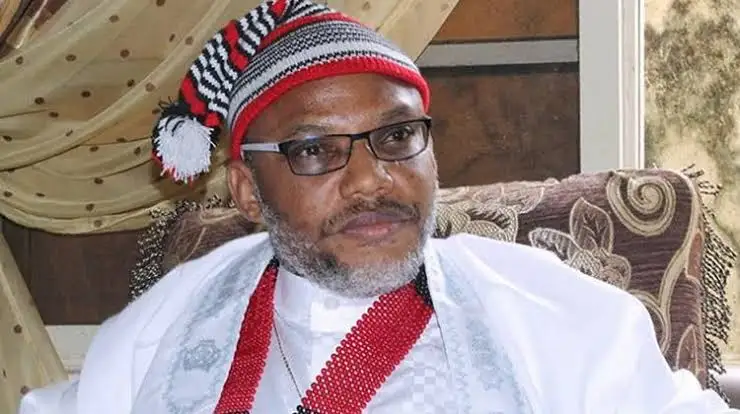Physical Address
304 North Cardinal St.
Dorchester Center, MA 02124
Physical Address
304 North Cardinal St.
Dorchester Center, MA 02124

In a dramatic turn of events in the high-profile trial of Nnamdi Kanu, the detained leader of the proscribed Indigenous People of Biafra (IPOB), Kanu on October 21 submitted a motion to the Federal High Court to formally open his defence. In that motion, he named several prominent figures — including Nyesom Wike, Dave Umahi, and retired General Tukur Buratai — among the witnesses he plans to call.
Kanu’s motion, personally signed, notified Justice James Omotosho that he was ready to begin presenting his defence in compliance with the court’s earlier directive that Q4 2025 proceedings begin. The motion came shortly after a panel of medical experts — appointed by the court — cleared Kanu as medically fit to stand trial.
In his filing, Kanu sought a 90-day window to conclude his defence, citing the volume of evidence and the large number of witnesses he intends to present. He stated his intention to testify personally under oath, offering his side of events and providing context around his statements and actions.
Kanu informed the court that he would present 23 witnesses, divided into two groups: “ordinary but material witnesses” and “vital and compellable witnesses” to be summoned under Section 232 of the Evidence Act, 2011. The compellable category is especially significant, as it enables court-ordered attendance even if a witness is reluctant.
Among those listed in the compellable category are names that carry significant political and security weight:
Kanu assured the court that each voluntary witness will provide sworn statements in advance, and that his defence team will promptly notify the prosecution of their identities, thereby ensuring fairness and transparency.
The selection of Wike, Umahi, and Buratai (and others) is bold—and strategic. These are figures who have held or now hold high office in Nigeria’s military, political, and security architecture. If they appear and give testimony, their statements could carry considerable gravitas and potentially shift the narrative of the case.
By invoking compellable status under the Evidence Act, Kanu’s team is forcing the court to make a determination: either these high-profile figures comply or face enforcement. That gambit, while bold, is fraught with legal, political, and logistical challenges.
The motion to open defence comes after Kanu’s earlier attempt to challenge the court’s jurisdiction via a preliminary objection — a strategy common in protracted political trials. With that jurisdictional question presumably resolved, the momentum now shifts to the substance of his case.
The court’s earlier order to begin proceedings on October 24, 2025 set the stage. Kanu’s motion is intended to align with that timeline, though his request for a 90-day extension underscores the complexity of his proposed defence. The number of high-profile witnesses and the potential logistical headache in summoning them are not trivial matters.
Additionally, by offering sworn testimony himself, Kanu places himself in the eye of legal scrutiny. His statements will be under cross-examination, and will likely be used by the prosecution to challenge his credibility, motives, or consistency with earlier statements.
While Kanu gears up to defend himself, related developments are unfolding outside the courtroom. A magistrate court in Abuja ordered the remand of Kanu’s special counsel, Aloy Ejimakor, along with 12 others, following protests demanding Kanu’s release. These individuals are charged with criminal conspiracy, disobedience to lawful orders, incitement, and disturbance of public peace under provisions of the Penal Code. They are currently held at Kuje Correctional Centre, awaiting arraignment on October 24, 2025.
The simultaneity of these events — the opening of his defence and the detention of his legal team’s associates — raises questions about procedural fairness, access to counsel, and the broader political climate. Kanu’s defence might need to navigate potential disruptions or limitations resulting from these linked cases.
Nnamdi Kanu’s decision to formally open his defence and summon a constellation of heavyweight political and security actors as witnesses marks a dramatic escalation in his trial. The move blends legal strategy with political symbolism. Should these persons agree to testify, the courtroom battle may pivot into deeper and more consequential arenas than before. Over the coming weeks, the court’s rulings on compellability, defence-prosecution clashes, and the quality of witness testimonies will be pivotal not only for Kanu’s fate, but for the broader stakes of justice, accountability, and national stability in Nigeria.
For more newsplash follow our website (valreorts.com)